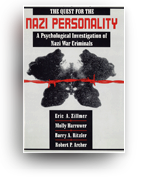 |

Open to Interpretation…The Art and Science of Inkblots
Ashland, OH: Hogrefe, 2009
[more]
............................................
Principles of Neuropsychology
Belmont, CA: Wadsworth, 2008
[more]
............................................
Military Psychology: Clinical and Operational Applications
New York, NY: Guilford, 2006
[more]
............................................
The Quest for
the Nazi Personality
Hillsdale, NJ: Lawrence Erlbaum Associates, 1995
............................................
Neuropsychological Assessment and Intervention
Springfield, IL: Charles Thomas, 1992
[more]
|
 |
|
 |
 |
 |
THE QUEST FOR THE NAZI PERSONALITY:
A Psychological Investigation of Nazi War Criminals

Eric A. Zillmer, Molly Harrower, Barry A. Ritzler, & Robert P. Archer
Hillsdale, NJ: Lawrence Erlbaum Associates, 1995
|

It seems that at some point popular culture, especially American culture, was full of images of the Rorschach test, and that the heyday of the Rorschach test is over. Was the test very popular when it was administered in Nuremberg in 1945?
The heyday was definitely in the 1950s and 60s when it was the most frequently used psychological test. As of five years ago, it had dropped to fourth position. The decline is in part because of the complexity of the test and in part because of the reimbursement pattern of insurance companies; it takes about two hours to administer and score the test and it's expensive. It's much easier to do a behavioral rating scale or a quick interview. And the Rorschach is also complicated to teach. It really takes a minimum of five years to master the test.
But in the past, the Rorschach was also give to individuals who were well known as a way of tracking or understanding their personality. Einstein, FDR, and Linus Pauling took the Rorschach, for example. Unfortunately, in the current climate, very few people who are famous are going to subject themselves to a Rorschach test and give over the results. People are less interested in self-exploration, and celebrities are very concerned about their image. I think there are also legal issues.
Almost all the psychiatrists and psychologists who were interested in psychodiagnosis, the Rorschach technique, were Jewish and left Germany for the US in the 1930s. And the United States became very fertile ground. I'm a member of the International Rorschach Society, and I think there are only one or two German members in a society that has hundreds, or even thousands of members. So basically, the test left Germany and Switzerland with World War II.
Next Question...
|
|